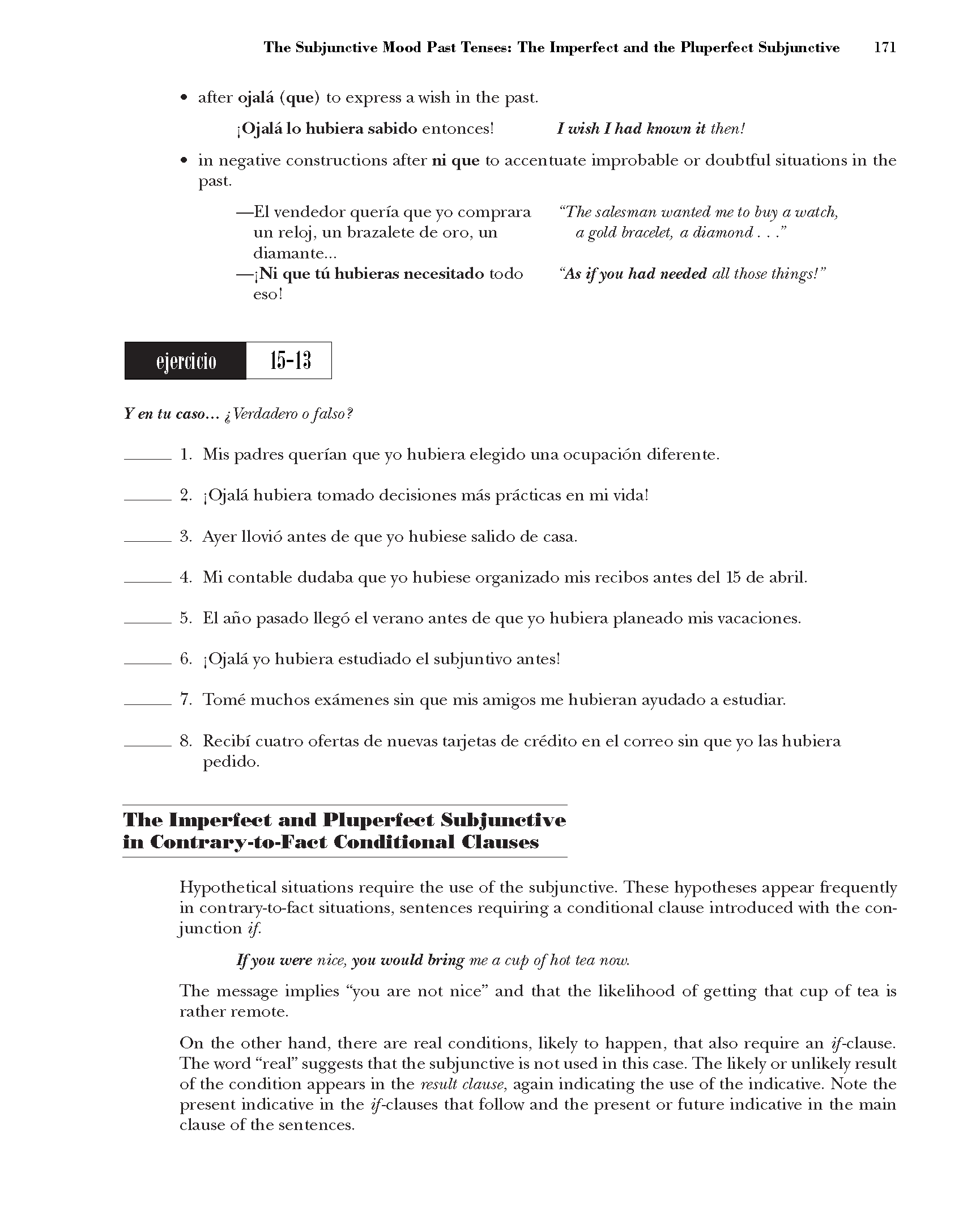CSG182

171
The Subjunctive Mood Past Tenses: The Imperfect and the Pluperfect Subjunctive
• after ojala (que) to express awish in the past.
jOjala lo hubiera sabido entonces! I wish I had known it then!
• in negative constructions after ni que to accentuate improbable or doubtful situations in the past.
—El vendedor queria que yo comprara "The salesmcm wanted me to buy a watek,
un reloj, un brazalete de oro, un a gold bracelet, a diamond ...”
diamante...
—i Ni que tu hubieras necesitado todo “As ifyou had needed all those things!” eso!
ejercicio
Yen tu caso... iYerdadero o falso?
_ 1. Mis padres quenan que yo hubiera elegido una ocupación diferente.
_ 2. jOjala hubiera tornado decisiones mas practicas en mi vida!
_ 3. Ayer llovió antes de que yo hubiese salido de casa.
_ 4. Mi contable dudaba que yo hubiese organizado mis recibos antes del 15 de abril.
_ 5. El ano pasado llegó el verano antes de que yo hubiera planeado mis vacaciones.
_ 6. jOjala yo hubiera estudiado el subjuntivo antes!
_ 7. Tome muchos examenes sin que mis amigos me hubieran ayudado a estudiar.
_ 8. Recibi cuatro ofertas de nuevas taijetas de credito en el correo sin que yo las hubiera
pedido.
The Imperfect and Pluperfect Suhjunctive in Contrary-to-Fact Conditional Clauses
Hypothetical situations require the use of the subjunctive. These hypotheses appear ffequently in contrary-to-fact situations, sentences requiring a conditional clause introduced with the con-junction if.
Ifyou were nice, you would bring me a cup of hot tea now.
The message implies “you are not nice” and that the likelihood of getting that cup of tea is rather remote.
On the other hand, there are real conditions, likely to happen, that also require an if-clause. The word “real” suggests that the subjunctive is not used in this case. The likely or unlikely result of the condition appears in the result clause, again indicating the use of the indicative. Notę the present indicative in the if-clauses that follow and the present or futurę indicative in the main clause of the sentences.
Wyszukiwarka
Podobne podstrony:
CSG182 171 The Subjunctive Mood Past Tenses: The Imperfect and the Pluperfect Subjunctive •
CSG184 173 The Subjunctive Mood Past Tenses: The Imperfect and the Pluperfect Subjunctive In real an
CSG174 163 The Subjunctive Mood Past Tenses: The Imperfect and the Pluperfect SubjunctiveThe Imperfe
CSG176 The Subjunctive Mood Past Tenses: The Imperfect and the Pluperfect Subjunctive 165 5. &
CSG178 167 The Subjunctive Mood Past Tenses: The Imperfect and the Pluperfect SubjunctiveOther Uses
CSG180 The Subjunctive Mood Past Tenses: The Imperfect and the Pluperfect
CSG184 173 The Subjunctive Mood Past Tenses: The Imperfect and the Pluperfect Subjunctive In real an
CSG173 Unit 15The 8ubjunotive Mood Past Tenses:The Imperfect and the Pluperfect Snbjnnctive Before l
CSG046 Unit 4The Preterit TenseRegular Verbs in the Preterit The preterit (el preterito) is one of s
File0014 I can tell a short stery osiny past ttnses. 2 1 $1.16 Read and liste
057 8 Nom©________ SkiU: Cut and past© 8« Cut out and pastę the triangles onto the matching
Conseryation ethic: it is good, a social duty, to preserve the past (Lipę 1977; Lowenthal and
ape 056 56 ANDERSONA PHYSICAL EDUCATION Figurk 24 Side to the E.erciser. Right arm down past front&n
więcej podobnych podstron